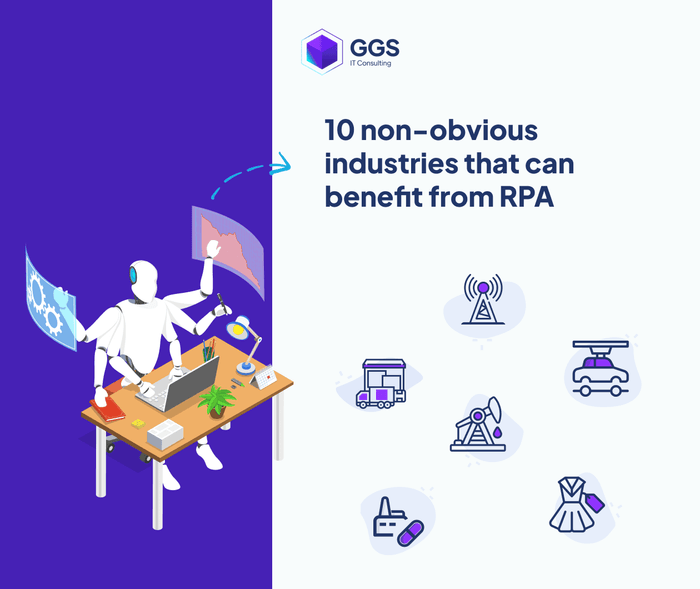
10 Non-Obvious Industries That Can Benefit From RPA

Robotic Process Automation technology is being used increasingly to perform time-consuming tasks within business processes. Because RPA software can assist employees or replace them in manual and repetitive tasks, automation can be implemented in any industry where such actions can be identified. That being said, some industries can benefit more from robotic process automation, because the number of tasks that they can automate guarantees higher ROI.
Which industries can use robotic process automation?
Enterprises in multiple industries are benefiting from RPA by accelerating back-end processes. According to Office Worker Survey, conducted by UiPath, 67% of global office workers feel crushed by doing repetitive tasks. They would like to automate many of them, including e-mails, data input, creating datasets, scheduling calls and meetings.
Which industries can use and benefit the most from RPA? Most use cases of automation implementations describe banking, accounting, or insurance companies, that is why in this article we decided to show the benefits of automatization for other branches as well.
The financial sector was one of the first industries to use robotic process automation, but today RPA software has an increasing role across many branches, including retail, construction, telecommunication, oil, gas and energy, pharmaceutical, utilities, automotive, fashion, logistics, or food industry.
From knowledge sharing to lower costs to higher employee satisfaction, RPA can make a huge difference in the quality and efficiency of any company. If you have not found examples matching your industry specifics, we encourage you to read through our article about 10 business processes you can automate using Robotic Process Automation, where you can find more general information, suited for each company's needs.
Robotic process automation in the retail industry

Implementing RPA in the retail industry improves the productivity and accuracy of multiple processes, which don’t have to be manually performed by humans any longer.
RPA use cases for retail are automatic pricing and inventory adjustment, as well as using bots to obtain data from customer complaints and opinions in real-time. Such data can be then used by multiple departments in the enterprise, including marketing, sales, research & development, and manufacturing.
But there is more to gain in retail with RPA, as a vast number of tasks can be automated in many areas, including:
- store planning,
- inventory management,
- product categorization,
- logistics and supply chain management,
- business and sales analytics,
- launching new products,
- customer support management,
- consumer behavior analysis,
- automated customer loyalty programs,
- EOD and Month-end Reporting,
- payment processing.
As estimated in Online Retail Forecast by FTI Consulting, online sales in the US alone are expected to double by 2023, reaching approximately 20 to 25% of the overall retail sector. Such fast growth will force many companies to reorganize their business processes, especially those connected with e-commerce, to keep up with demand and remain competitive.
Robotic process automation in the construction industry
Construction companies that are working on multiple projects, both locally and worldwide have numerous employees in financial, accounting, and human resources departments, which can benefit from using automation. The construction industry has to deal with tight margins and an ongoing labor shortage - in such conditions possibility to free up employees to work on other tasks by using RPA will make a significant difference to a company’s bottom line.
RPA tools can be used to automate common, repetitive tasks for construction companies, such as invoice generation and processing, document management, human resources processes, marketing activities like mass e-mailing, manual data entry, internal reporting, and much more.
Industry-specific uses of robotic process automation in construction may include:
- construction site cost monitoring,
- estimate generation / RFP response,
- ordering PPE & Equipment,
- resource allocation between construction sites,
- contract generation,
- project sorting and updates, with data validation.
A great example of robotic process automation in construction is the case study of Skanska, one of the world's leading construction and project development companies, which implemented UiPath solutions in automation.

Skanska started using UiPath solutions for RPA in 2017, by gradually automating many of the tasks involved in customer invoice handling and processing, payments, reminders, and the management of accounting journals. As a result, between 2017 and 2021 Skanska has been able to automate 35 processes accounting for over 10,000 hours returned to the business every year.
As the next step, automation was implemented in HR, where software is controlling vast amounts of payment data sent from the payroll system to the ERP. The robot takes five minutes each day to check the millions of transactions - a task that was consuming a week of employee time each month.
Robotic process automation in the telecommunication industry

Telecommunication providers often use multiple data sources, applications, and operating systems running simultaneously to support operations. In many cases, inconsistencies in data storage between different platforms cause major delays in data exchange, often requiring employees’ manual intervention. Such complexity gives many opportunities for successful RPA implementation.
The use of robotic process automation in the telecommunication industry helps to reduce error rates, improves data quality, speeds up customer service, boosts up operational efficiency. RPA guarantees also high levels of data security and enables rapid internal cost reduction and ROI.
Some of the RPA use cases in the telecommunication industry include:
- simplifying customers document verification,
- speeding up SIM card allotment process,
- optimizing number portability,
- guaranteeing on-time billing and fast payment processing,
- simplifying data entry with OCR technology,
- increasing First Call Resolution (FCR) rate,
- automating data format transformation,
- optimizing customer onboarding/offboarding process.
According to industry leaders, one of the biggest priorities for the telecom industry is managing the customer experience. As stated in “Ernst & Young’s Global telecommunication study: navigating the road to 2020”, among telecom industry leaders, “customer experience management is emphatically the top priority for 68% of the survey participants.” Rapid industry growth and an increasing number of processes make it harder for telecom providers to achieve satisfactory levels of customer care.
Robotic process automation is one of the solutions which enables telecom service providers to scale and respond better to market situations.
Robotic process automation in the oil, gas, and energy industry

For many years oil and energy companies have been focusing on applying automation technology to operations in the field. Seeing success in that area now similar technologies are being implemented in back-office operations as well.
RPA in the oil, gas & energy industry is implemented to perform repetitive tasks in multiple areas, not only general data analytics and human resources but also reporting for exploration, trading, and safety check-lists. RPA can be applied across a wide number of processes within the industry.
Analytics of Oil & Gas Middle East estimate, that digital transformation could generate an extra $1.6 trillion in value for the oil, gas, and energy industry by 2025. An important part of the transformation is implementing robotic process automation, supporting companies in various areas, involving:
- data analytics and reporting for exploration and production,
- environmental health and safety reporting,
- contract meter assignment,
- process reports from supervisors, drilling specialists, and well operators,
- processing data from external geology sources for project forecasting,
One of the greatest advantages of RPA in the oil, gas, and energy industry is solving a problem of integration, caused by legacy systems dependency. Because of almost no coding skills needed to use this specific software, RPA technology is compatible with the current infrastructure of any company, can be deployed effectively and efficiently.
Robotic process automation in the pharmaceutical industry

RPA in the Pharma industry increases efficiency, improves performance, as well as it lowers time-to-market. Professional implementation can minimize human errors, which are unavoidable when performing tasks that are monotonous in nature.
Robotic Process Automation in the pharmaceutical industry allows automating process-oriented and error-prone tasks. Processes that can be done by bots can include shipment receivals, forecast and demand planning, supplier relationship management, as well as inventory and testing controls.
According to the 2020 Bain report “Global Technology Report”, “84% of the companies across the pharmaceutical industry spectrum plan to take action in the direction of accelerating automation efforts”.
Implementation areas for Pharma are not limited to administration or human resources - RPA can affect pharmaceutical companies in many other ways, not only in the back office but through clinical trials or regulatory compliance as well.
Use cases of automation in the pharmaceutical industry may include:
- clinical trials - as highly standardized procedures CT will benefit thanks to consistency, quality control, and accuracy in data entry, guaranteed by automated processes,
- supply chain and inventory management - RPA will improve procurement and shipping, as well as order and invoice processing. Thanks to effective supply and demand planning operational costs can be reduced at a significant level,
- freeing sales representatives time - because of automating data entry, records monitoring and customer feedback tracking sales reps will have more time to focus on customer acquisition and conversion.
Robotic process automation in the utility industry

Utility companies deal with thousands of installations, repairs, and maintenance jobs across water, gas, electricity, and telecommunications sectors on a daily basis. Related processes are prone to automatization, and RPA software guarantees increased efficiency and high-cost savings for utility companies.
The benefits of implementing robotic process automation for utility companies include more effective customer records management, faster complaints resolution, metering, and billing at lower costs. RPA affects also accounting workflows and minimizes variability in operational output.
According to Automation in Utilities study conducted by Capgemini, 40% of executives in utility companies reported an increase in operations quality as a benefit from their automation initiatives.
Other reported benefits included:
- improved workforce agility - 37%,
- increase in staff productivity - 33%,
- faster turnaround time for service requests - 32%,
- improved data consistency - 32%,
- fewer resources required to complete a process - 32%,
- better and faster compliance with legal/ regulatory - 28%,
- actionable operational insights - 27%.
Capgemini researches estimated that the energy and utility sector could save between $237 billion to $813 billion from RPA and intelligent automation at scale. One of the examples used in the study, showing potential benefits of automation describes the implementation of automation verification of meter readings by Gazprom. In the first two weeks, an employee was able to validate about 130 invalid meter reads, saving 10 hours of the week per employee.
Robotic process automation in the automotive industry

While most of the early automatization innovations in the automotive industry focused on the industrial aspect, analytics are seeing a major shift to Robotic Process Automation applications which, according to Grand View Research Robotic Process Automation Market Size Report, are expected to become an $8.7 billion market by 2024.
RPA for the automotive industry speeds up repetitive, manual tasks, boosting company efficiency. The use of automation ensures the elimination of manual errors, streamlining back-office operations, reducing complexities of managerial processes, improving interactions with suppliers, dealers, and end customers.
Tasks that RPA can solve for automotive companies may be found also in areas such as dealer management, finances, supply chain, and logistics or insurance claims. Some industry-specific use cases include:
- guaranteeing effective regulatory compliance,
- tracking inventory levels for particular parts,
- automating customer document requests,
- logging vehicle service reports and similar diagnostic data,
- speeding up data collection and verification for auto insurance.
Robotic process automation in the fashion industry
Large fashion industry companies have to manage multiple processes across customer care, procurement, and finance. To guarantee growth, industry leaders have to optimize productivity, efficiency, and cost savings - and that would be impossible without automating time-consuming processes.
The fashion industry is heavily relying on process speed and accuracy, and RPA is a perfect solution to consolidate business data and optimize business tasks. It is now used in digital product creation, and with the growth of e-commerce in fashion, automation helps with logistics and online merchandising.

An inspiring example of successful RPA implementation within the fashion industry is MAS Holdings - South Asia’s leading apparel and textile manufacturer. With the use of UiPath, the company was able to automate 52 processes, saving 14,000 man-days annually. It was achieved by automating tasks within the labor order placement process, product development, procurement, and shipping.
Other examples of robotic process automation use in the fashion industry are:
- replicating similar designs with different materials and colors in Digital Product Creation,
- applying a pre-defined set of rules to auto render high-quality images for e-commerce use,
- adding accurate measurement data into product development tool,
- data gathering, formatting, standardization, and plan simulations for demand and supply planning,
Robotic process automation in the logistics industry

With rapid growth and changes in the logistics & supply chain industry more companies recognize the importance of RPA for reducing costs and increasing productivity and efficiency.
Robotic automatization in logistics and supply chain improves company efficiency. Time-consuming processes optimized with RPA software, in the area of inventory management, supply and demand planning, or freight management are drastically improving the business effectiveness and profitability.
According to the report of the World Economic Forum “digitalization in logistics could unlock $1.5 trillion of value for logistics players by 2025”. For many companies implementing RPA is the first step of digital transformation. With many back-office operations performed manually, including updating customers' details with the current status and ETA, scheduling a delivery, or tracking, shipping and logistics companies can benefit heavily from such transformation.
In which areas logistics industry can get the most from robotic process automation? Real-life case studies include:
- scheduling and tracking shipments,
- speed invoicing and credit collections,
- supply and demand planning,
- refunds and returns processing,
- price lookup and comparison.
Frequently RPA implementation starts with one process as a test and can lead to a full-scale digital transformation of the company. Such was the case for Finland’s Posti Group, which first used UiPath Robotic Process Automation solutions for optimizing back-office departments. This leading mail carrier has branched out into parcel, e-commerce, and freight services over the years, and looked for ways to stay ahead of the competition.
The organization decided to replace slow, time-consuming manual tasks with RPA tools, so employees could focus more on customers. After initial success, software robots were implemented in several departments - Finance, Human Resources, Sales Support, Logistics, and Customer Service.
Robotic process automation in the food industry

With growing competition, food and beverage processors are constantly looking to improve the efficiency of their operations, keep the high quality of products, and increase profits. For many of those companies implementation of RPA can be a chance to streamline processes and reduce costs.
Companies in the food industry can benefit from robotic process automation (RPA) tools, which can assist in organizing and updating manufacturing records, sorting food safety audits, health and safety documents, or validating data for risk assessments, both internal and provided by suppliers.
As with any other industry, also food production and processing is using RPA for many back-office operations - such as human resources, finance, or accounting. But for this industry in particular benefits from automatization extend also to managing documentation and data surrounding product recall management and food safety.
Data important for the food industry, that can be gathered and sorted with RPA software include:
- allergen information,
- temperature control and storage conditions monitoring,
- container packaging and label requirements,
- inventory management based on customer demand and previous orders,
- supply chain management with e-mail automation, monitoring, and transport system integration.
How can we help your company in Robotic Process Automation?

With our experience from working on complex projects, as RPA consultants we are able to guide a company through the entire process of RPA implementation, from creating a strategy, discovering processes, designing optimal configuration, testing, up to full-scale use, and effectiveness monitoring.
GSS IT Consulting experts can support enterprises in starting digital transformation with:
- defining strategy,
- analyzing, understanding, and documenting business processes,
- setting up operating models,
- identifying technical infrastructure requirements to deploy automation solutions,
- educating employees and helping to create an “RPA-friendly” environment, where each team member looks for more automation opportunities to support company transformation,
- creating and documenting test scenarios and procedures to ensure optimal configuration,
- training team members in the building, operating, and maintaining automation solutions,
- helping to solve issues that arise in day-to-day operations with RPA software,
- further support of the implementation of any type of automation technologies by the company,
- helping to plan and set up Centers of Excellence or Process Mining Hubs, to boost up automation efforts.
If you wonder how to start or improve the implementation of automation and digitization of processes and document flow in your company, contact us for your 30 minutes free consultation.
After completing the form, we will arrange a call at a time convenient for you. During the call, our consultant will suggest how to approach the Robotic Process Automation initiative in your Company. Thanks to this, you will assess which technologies will bring you the greatest benefits in the area of automation and standardization of processes.
